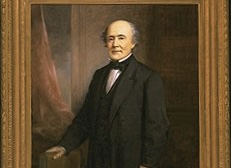
no description

no description
By the latter half of the 1860s, still working diligently under candlelight on his latest criticisms of U.S. tariffs and spending, Bellefonte’s own Robert Walker had constructed a complicated legacy amidst the most tumultuous time in American history.
Born the son of a Pennsylvania judge and attending the prestigious Bellefonte Academy, Walker followed the common path to political power in America: attend law school, open a practice, seek office. His family home in Bellefonte still stands at 133 North Allegheny Street and currently houses the Bellefonte Art Museum. After practicing law in Pittsburgh and later Natchez, Mississippi, Walker set about establishing his legacy. Through his law firm and speculation in raw materials and land, he was able to amass great wealth, albeit on the backs of slave labor. While a common practice in early 1800s Mississippi, the issue of slavery would continue to shape his career well into his terms in political office.

Walker’s first governmental position was in the U.S. Congress as a Mississippi senator, elected in 1835. Favorable newspapers quipped that “his private as well as his public character is without blemish,” boosting the perception of him as the friend of the working man. A vocal Jacksonian Democrat and ardent supporter of slavery in the antebellum South, Walker proved his true talent was working with the economy. He was a constant thorn in the side of the banks and aristocracy, decrying corruption and waste in the early banking system while championing favorable positions for southern interests. He cultivated his platform and used it to transform himself into one of the country’s most powerful senators, earning the moniker “the Wizard of Mississippi.”
It was in this position that Walker met his first major legislative battle: the annexation of Texas. In an assault made for the big screen, Walker launched the issue from the political backburner into the forefront of the Henry Clay vs. James K. Polk election of 1844 by publishing his “Letter of Mr. Walker, of Mississippi, Relative to the Annexation of Texas.” The debate on whether to annex Texas was largely drawn along party lines, and with Walker’s vocal support of Polk and annexation, the Democrats took the White House. Walker would be rewarded in turn, being named secretary of the Treasury.
In his capacity as Treasury secretary, the Bellefusian forced his name into the national vernacular. One of Walker’s first orders of business was to stimulate America’s somewhat foundering economy. He accomplished this with the so-called “Walker Tariff,” one of America’s deepest cuts on tariffs, increasing international trade and greatly benefiting plantation culture. The tariff also further engrained slavery in the South, with another incentive for planters like Walker to expand farms and increase their slave holdings.
After the Polk presidency, Walker returned to his law practice, this time in the District of Columbia while maintaining his interests in the South. He would continue to support his party’s stance on the growing unrest over slavery and voiced his approval of the controversial Compromise of 1850, which sought to define how slavery would be handled in new territories as America expanded. In 1857, Walker was appointed territorial governor of the Kansas Territory, presiding over the violent “Bleeding Kansas” conflict between pro-slavery agents and abolitionist John Brown. This issue, accompanied by the pro-slavery “Lecompton Constitution,” forced Walker to resign a mere seven months into his tenure, citing fraud and improper pressure from Democratic leadership.
The remainder of Walker’s career would stand in opposition to the positions he once held. Following his stint in Kansas, Walker actively pushed for Kansas to enter the Union as a free state. At the outset of the Civil War, despite his prior work as a Mississippi senator, Walker sided with the Union. Using his connections in international markets, Walker would travel to Europe and successfully work to prevent the Confederacy from securing foreign loans. In his final years, he even championed universal suffrage following the passage of the 13th Amendment, much to the chagrin of the Southern papers.
As one of Bellefonte’s seven governors, Robert Walker has been immortalized on the governors’ memorial at Talleyrand Park. From his roots in central Pennsylvania to Mississippi senator, to Treasury secretary, to governor, Walker left a political legacy that remains a complicated topic, requiring a deep understanding of the time period and political atmosphere. T&G
Local Historia is a passion for local history, community, and preservation. Its mission is to connect you with local history through engaging content and walking tours. Local Historia is owned by public historians Matt Maris and Dustin Elder, who co-author this column. For more, visit localhistoria.com.
Sources:
Barksdale, E. (1867, December 19). The Present Political Status of Robert J. Walker. The Daily Clarion, p. 2.
Fall, G. E. (1834, October 10). Robert J. Walker. The Mississippian, p. 3.
Robert J. Walker (1845–1849). Miller Center. (2017, February 23). Retrieved May 1, 2023, from https://millercenter.org/president/polk/essays/walker-1845-secretary-of-the-treasury
Walker, R. J. (n.d.). Letter of mr. Walker of Mississippi, 1844. Letter of Mr. Walker of Mississippi, 1844 | TSLAC. Retrieved May 1, 2023, from https://www.tsl.texas.gov/exhibits/annexation/part4/walker_letter_1844_titlepage.html
Tariff of 1846 (Walker Tariff), July 30, 1846. https://fraser.stlouisfed.org/title/5899, accessed on May 1, 2023.
Receive all the latest news and events right to your inbox.
403 S. Allen Street
State College, PA 16801
Phone: 814-238-5051
